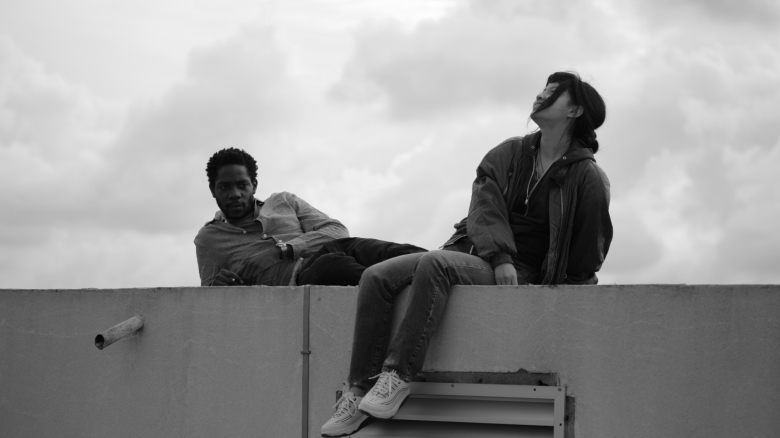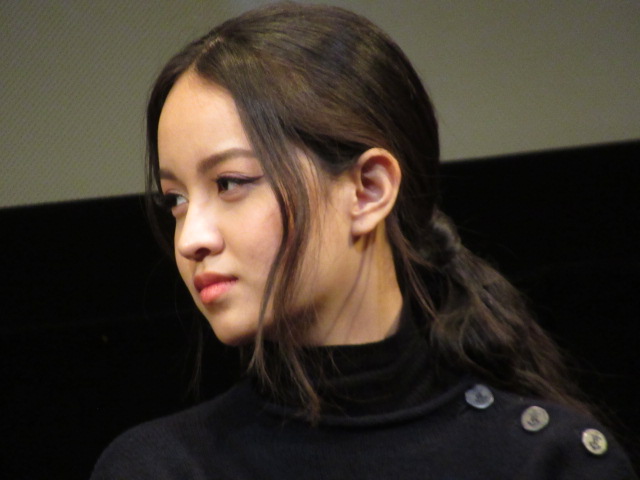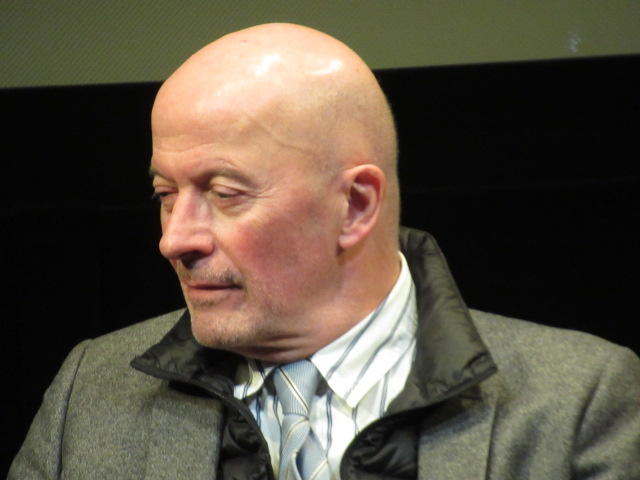For the first time in three years, The Rendez-Vous with French Cinema festival in March at Lincoln Center in New York City had screenings with live appearances from major French filmmakers. In 2020, international travel was curtailed due to covid. My last night there was the night New York’s cultural attractions closed. Last year, Rendez-Vous was virtual.

Juliette Binoche at Opening Night of Rendez-Vous with French Cinema
The opening film “Fire” (“Avec amour et acharnement”) was introduced by its director Claire Denis (“Beau Travail”) and lead actress Juliette Binoche. Denis’ visual artistry and intense performances from Binoche and Vincent Lindon bring a vitality to this film about a romantic triangle. Binoche and Lindon portray lovers whose life is thrown into turmoil when Binoche’s former partner (Grégoire Colin) and friend of Lindon returns into their lives. The continued fervor of the lead performances makes the title (called “Both Sides of the Blade” outside the US) quite appropriate.
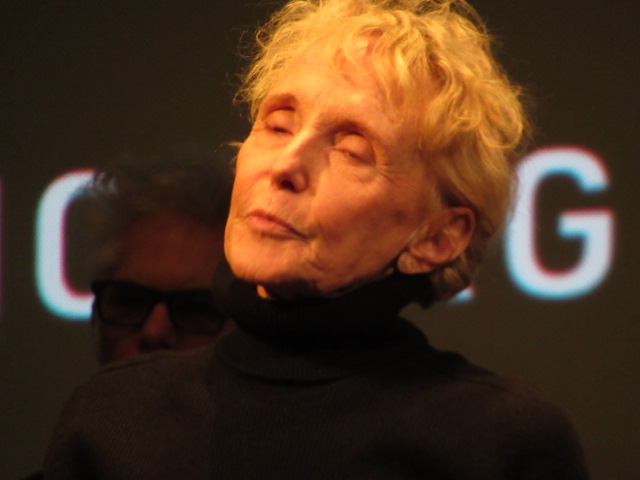
Claire Denis at Opening Night of Rendez-Vous with French Cinema
Also at the opening night was director Jim Jarmusch, Rendez-Vous Special Guest. Jarmusch said France “practically invented cinema”. Claire Denis had been assistant director on his 1986 “Down by Law”. Jarmusch said Denis was “like my sister”. Jarmusch also introduced a screening of the 1954 “Touchez pas au grisbi” chosen by him.
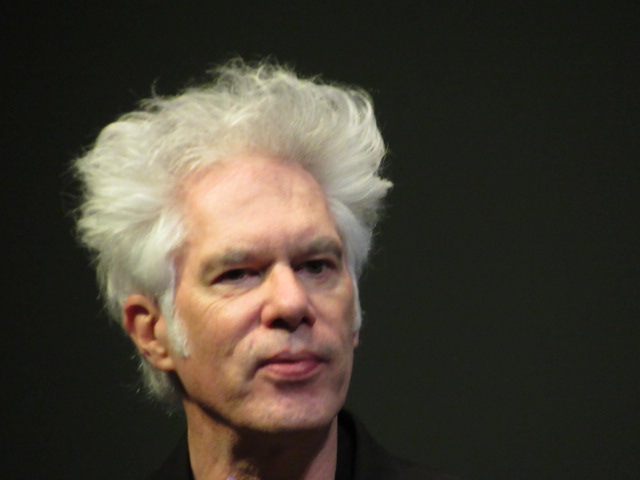
Jim Jarmusch at Opening Night of Rendez-Vous with French Cinema
Besides Denis, more of France’s major directors appeared to discuss their latest films at Rendez-Vous. After the screening of “Paris, 13th District” (“Les Olympiades, Paris 13e”) Jacques Audiard (“A Prophet”, “Dheepan”) spoke about his adaptation of a graphic novel into film. The simple plot of passionate couplings between young Parisians is enhanced by striking B&W photographic images. Lucie Zhang makes an impression as a young woman who becomes involved with her first roommate.
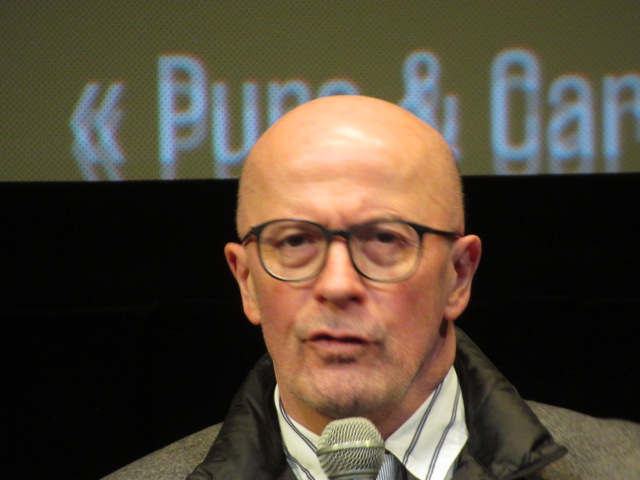
Jacques Audiard at Rendez-Vous
Under Arnaud Desplechin’s (“A Christmas Tale”) staging the actors perform with emotional range, including occasional wit, in “Deception” (“Tromperie”), his film version of Philip Roth’s novel. A novelist Philip (Denis Podalydès) converses with his married lover (Léa Seydoux, “No Time to Die”) and thinks back on the women in his life. Seydoux is a particularly potent presence. Scenes of the writer and a former partner (Emmanuelle Devos) are extremely poignant. The actors and Desplechin’s camera work help this conversation-based film maintain interest. At a post-screening discussion, Desplechin said that because of covid delays of other films, he was able to get the in-demand Léa Seydoux for this film.

Arnaud Desplechinat Rendez-Vous
Mathieu Amalric who had acted in French and international films like “The French Dispatch” also has a career as a director. Amalric was at Rendez-Vous with Vicky Krieps (“The Phantom Thread”), lead actress of his latest directorial effort “Hold Me Tight” (“Serre moi fort”). Krieps gives a superb performance of emotional depth as a woman who leaves her family at the beginning of the film. Director Amalric and Krieps keep the film intriguing, even when unsure of the film’s reality.

Mathieu Amalric at Rendez-Vous
Rendez-Vous also showed films from celebrated filmmakers not in attendance. “Everything Went Fine” (“Tout s’est bien passé”), is the latest from François Ozon (“Summer of ‘85”) who has worked in a wide variety of genres. This film is a deeply moving drama of the emotional and legal consequences when a father, after a stroke, asks his daughter to assist in his suicide. As the father and his daughters, André Dussollier, Sophie Marceau and Géraldine Pailhas give superior performances as does Charlotte Rampling as Dussollier’s chilly wife. The film skillfully includes some unexpected humor.
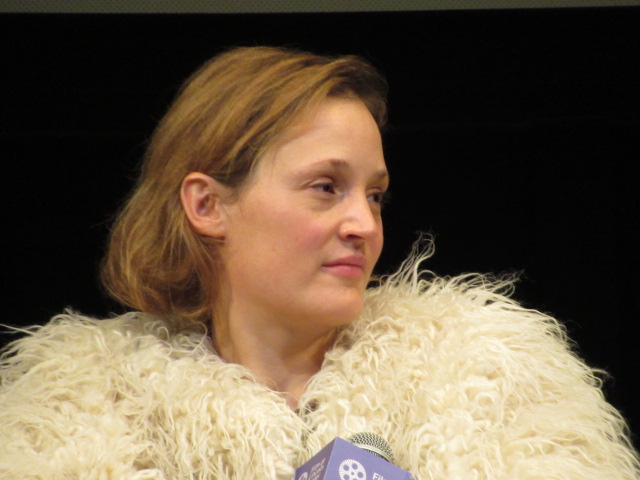
Vicky Krieps at Rendez-Vous
“Rise”, (“En corps”) from Cédric Klapisch (“L’Auberge espagnole”) is a compelling film about a ballerina whose life is radically changed when she has a serious injury on stage after discovering her partner is unfaithful. Real life ballet dancer Marion Barbeau is effective as the lead. Another audience pleaser from Klapisch, “Rise” received the Rendez-Vous Audience Award.
“Guermantes”, written and directed by Christophe Honoré (“Love Songs”), was the one misfire I saw at Rendez-Vous. When Honoré’s stage-directed production of Marcel Proust’s “The Guermantes Way” was cancelled, the troupe still worked together, documented in his film. Without insights on how the group’s behavior follows the Proust original, the film is just a rambling, empty collection of scenes without any insight into the troupe members.
“Lost Illusions” (“Illusions perdues”) was the finest of the eighteen films I saw at Rendez-Vous. This adaptation of the Balzac novel is masterful and vibrant cinematic storytelling from from director Xavier Giannoli who co-wrote the screenplay. Lucien, an idealistic young poet (Benjamin Voisin) moves to Paris inspired to write a novel, but his life takes a different turn when he meets a worldly editor (Vincent Lacoste). He becomes part of a cynical world where favorable theatre reviews require bribes, and the audience cheers or boos go to the highest bidder.
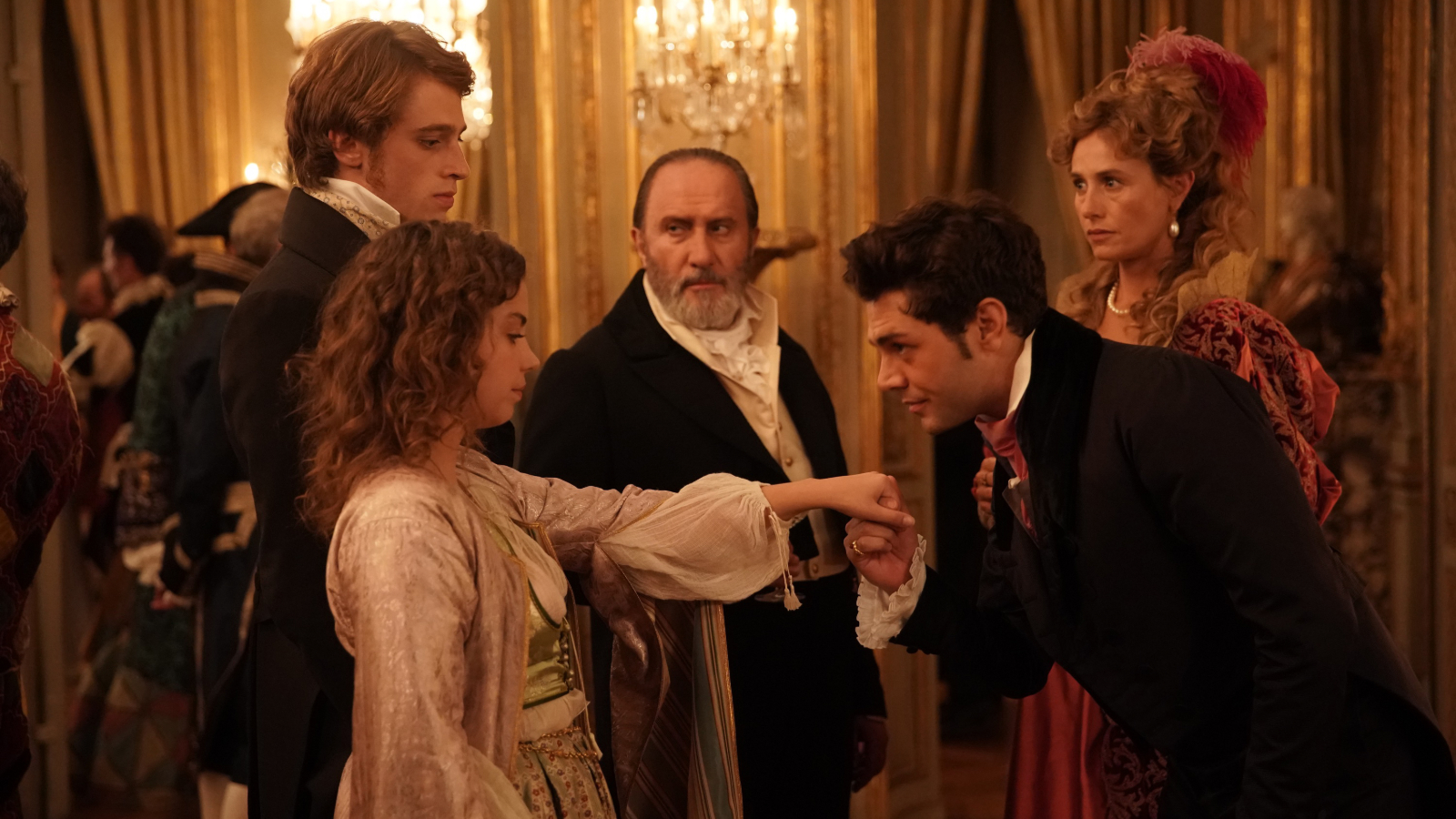
“Lost Illusions”
Giannoli keeps the film at a brisk pace. The terrific ensemble includes Gérard Depardieu as a publisher who can neither read nor write. Giannoli makes this Balzac adaptation, set in the 1820s seem relevant in this current era of “fake news” and “alternative facts”. The film received seven Cesars, the French Oscars, including Best Film, Male Newcomer (Voisin), and Supporting Actor (Lacoste).
Juliette Binoche also appeared with “Between Two Worlds” (“Le Quai de Ouistreham“), another highlight. Binoche is exceptional in this film, based on events. She portrays a writer who goes undercover to study the conditions of cleaning women. The film conveys the extremely grueling work as the writer joins a crew that must quickly clean a ferry in a brief stopover time. without being observed. The writer becomes conflicted after she becomes confidante of a woman in the cleaning crew as she continues her deception to write about her fellow workers, adding poignancy to this enthralling film.
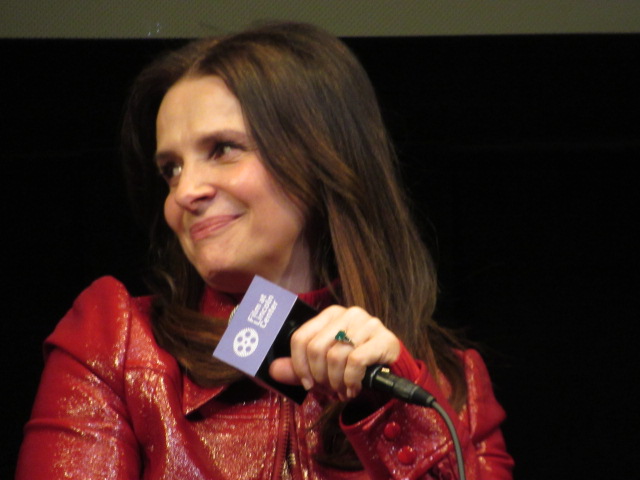
Juliette Binoche at Rendez-Vous
“Anaïs in Love” (“Les Amours d’Anaïs”) is an enjoyable film of a young woman rushing through life. She’s attempting to finish her thesis and is quick to change partners until she’s drawn to an unexpected choice.
“A Tale of Love and Desire” (“Une histoire d’amour et de désir”) which received audience honorable mention was the best of the French films on l’amour. In this “Tale”, very well-written by director Leyla Bouzid, two very different students of Arab descent meet at the Sorbonne and are drawn to each other. Ahmed (Sami Outalbali) comes from a conservative background while Farah (Zbeida Belhajamor) is free-spirited. As Ahmed learns about sensual Arab poetry, he starts to question his beliefs, leading to tension in his relationship with Farah, making for a very absorbing drama.
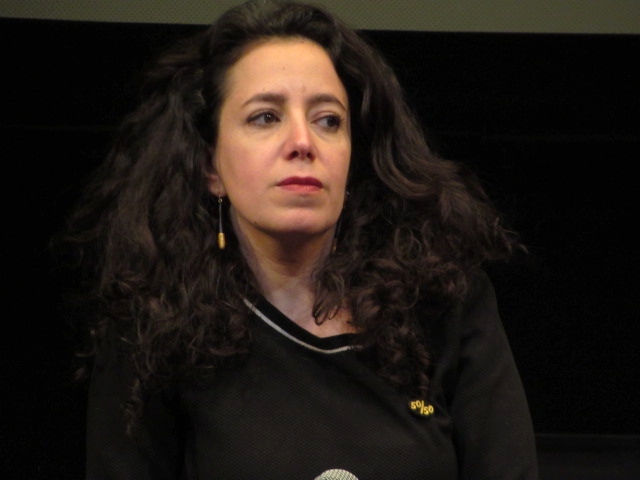
Leyla Bouzid at Rendez-Vous
The variety of film subjects continued. Good performances in “Robust” (Robuste”) make this formulaic film about a temperamental actor (Gérard Depardieu) and his new security guard (and amateur female wrestler) (Déborah Lukumuena) engaging. “Authentik” (“Suprêmes”) was a vivid recreation of the time when rap duo Joey Starr and Kool Shen attracted attention and controversary.
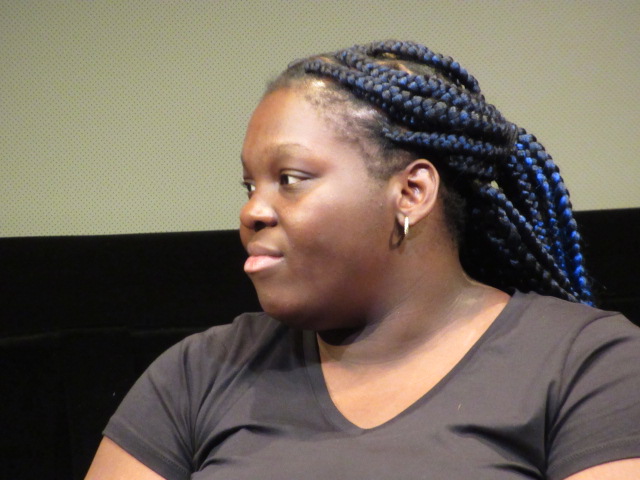
Déborah Lukumuena at Rendez-Vous
“Our Men” is a strong, well-acted drama on soldiers in the French Foreign Legion sent on dangerous foreign assignments and the stress on their families from their repeated absences. The cast is led by Louis Garrel (“The Dreamers”) and Camille Cottin (“Call My Agent”) as an often-separated couple. Writer-director Rachel Lang has a background as an officer in the French army reserves.
“Secret Name” (“La Place d’une autre”) is a fascinating film about identity in which a prostitute turned nurse (Lyna Khoudri, “The French Dispatch”) during WWI takes the place of a woman she believes is dead (Maud Wyler) who was going to live with a wealthy woman. Suspense builds with an unexpected appearance. Khoudri and Wyler give notable performances as does Sabine Azéma as the aging aristocrat.
Future blogs will cover the French films in more detail, along with comments from the filmmakers.
